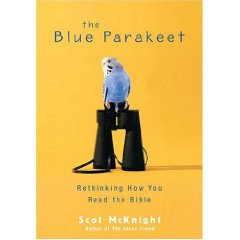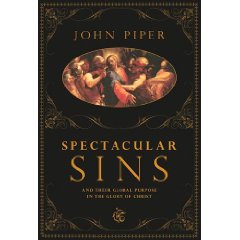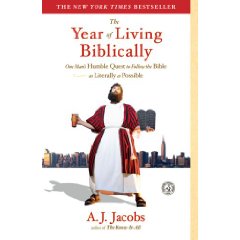 Our last post quickly listed a handful of new titles that have appeared here at the bookstore in the last week. There are more, and I will get to them soon, but I feel compelled to backtrack and say just a bit more about one of the titles I highlighted, The Blue Parakeet: Rethinking How You Read the Bible by Scot McKnight (Zondervan) $18.99. I was fair, if brief, telling you that it was great, and noting that it about recovering a sense of the Bible as a narrative; that it, it is about Story.
Our last post quickly listed a handful of new titles that have appeared here at the bookstore in the last week. There are more, and I will get to them soon, but I feel compelled to backtrack and say just a bit more about one of the titles I highlighted, The Blue Parakeet: Rethinking How You Read the Bible by Scot McKnight (Zondervan) $18.99. I was fair, if brief, telling you that it was great, and noting that it about recovering a sense of the Bible as a narrative; that it, it is about Story.
Indeed it is. Phyllis Tickle, in fact, says that “it is far and away the best, gentlest, most intelligent argument I have ever read for the absolute necessity of embracing the Bible as story.” But as I’ve now almost finished it, I realize it is about something even deeper: how to be honest in our Bible reading and how to allow the Story to shape our lives. The object of Bible reading, he shows (drawing on sources as diverse as fabulous teachings from St. Augustine to contemporary educational theory), isn’t to know more information, not even to “get it right” and not even to know God better, but to become the people God calls us to be, doing the things that our relationship as followers saved by the grace of Jesus, would properly entail. It is central to his invitation to Bible reading as “missional listening” that we “get” what the book–and more, the Author of the Book—is asking us to do. And then to do it. Right on! (Uhh, I think.)
Of course, we all know (although some of us don’t think about it much) that we don’t all obey the Bible as we say we do. We disregard huge amounts, even of Jesus’ teaching, and we often are less than honest about the haphazard way we “pick and choose.” We all do it, and usually don’t know really why (why ignore this text and not that one; why cite the verse against homosexuality in Leviticus 19 but not the next one about the horrors of mixing different kinds of cloth or the one about men not trimming the sides of their hair? Or, why don’t we recite the Lord’s Prayer every time we pray as the best translation of Luke 11:2 specifically commands?)
Most of us just go with some sort of unspoken code of what we are supposed to pay attention to and what we aren’t. That we “adopt and adapt” what we do try to follow is only a bit less obvious (and, again, not always admitted.) So for conservatives or liberals, for evangelicals or mainline folk, this Blue Parakeet book is a refreshing reminder—heck, I don’t know if it is reminder, or a new clarion call unlike any I’ve ever read before**—to be honest about our view of the Bible, and wise in our discernment of how best to figure out what we are called to be and do as we engage the sacred text.
**to be honest, there are some critics who do point this out, and use it to dismantle Biblical authority or mock Christian conviction. Please know that this book is not one of those!
One helpful thought McKnight fleshes out quite a bit, which I can only name, here, is the difference between reading by tradition or reading through tradition. He develops a helpfully balanced view and shows it how it works. Obviously, Scot is no traditionalist. Yet, he warns against some individualistic illusion that we just naively read the Bible and figure it out and live it faithfully right now just like great Bible readers always have. (His last few chapters on the role of women in church leadership will seem less urgent to our mainline friends than to conservatives who still struggle with certain Pauline texts, and who worry that a contextualized reading of those passages will be a slippery slope to other liberating themes. Hmmm.) Professor McKnight is helpful guide here, I am sure of it.
 Here is a website about his work, listing his credentials and books, and some interviews and podcasts of talks he’s given. Check it out, but come on back… He’s a wicked cool blogger, too, so you may want to follow his various pieces there.
Here is a website about his work, listing his credentials and books, and some interviews and podcasts of talks he’s given. Check it out, but come on back… He’s a wicked cool blogger, too, so you may want to follow his various pieces there.
McKnight’s humble and honest and very delightful style makes for a great read, and this book is a large warning against bombast and hubris whenever we preach or teach the Bible, a call to humility on all theological camps and sides. Mainline churches and many sophisticated Christians may think they needn’t fuss with this, since they don’t have any intentions of taking the Bible literally. Still, how do we take it? This is a book that will help all factions within the Body of Christ to grapple with this question.
(Interestingly, I am also reading the new Bible study book by John Piper provocatively called Spectacular Sins and their Global Purpose for the Glory of God (Crossway; $15.99) which is written with a somewhat different tone, as it shows utter confidence that it is clear what Bible verses to take literally and what it means to honor them properly. I enjoy Piper, and respect his insight and perspective, sensing I am in the presence of someone whose passion for God is palpable, like some modern-day Jonathan Edwards; I think it is important to read him well, and believe God’s people would be blessed if we had more pastor/theologian/preachers like him. His call to respect the teaching of the Bible about God’s sovereignty in all things–“you meant it for evil, but I meant it for good!”—is profound. Yet, Scot’s light touch and call to admit that we all skip certain verses and ignore others, is true, Piper’s integrity and Biblical conservatism and doctrinal consistency notwithstanding. I wonder what the two of them would say to each other…)
Spectacular Sins and their Global Purpose for the Glory of God (Crossway; $15.99) which is written with a somewhat different tone, as it shows utter confidence that it is clear what Bible verses to take literally and what it means to honor them properly. I enjoy Piper, and respect his insight and perspective, sensing I am in the presence of someone whose passion for God is palpable, like some modern-day Jonathan Edwards; I think it is important to read him well, and believe God’s people would be blessed if we had more pastor/theologian/preachers like him. His call to respect the teaching of the Bible about God’s sovereignty in all things–“you meant it for evil, but I meant it for good!”—is profound. Yet, Scot’s light touch and call to admit that we all skip certain verses and ignore others, is true, Piper’s integrity and Biblical conservatism and doctrinal consistency notwithstanding. I wonder what the two of them would say to each other…)
So, The Blue Parakeet isn’t the final word, maybe not even the best word. But it is thrilling, stimulating, gracious and one of the clearest examples I’ve seen of an honest call to figure out a way to be faithful in our reading, in our discipleship, in our doctrine and in our living. The author of The Jesus Creed here has given us “a Bible creed” about first things. How to read, how to engage, how to hear, how to discern, and how to live, this complicated, crazy-making, glorious, dear, sweet, and at times confounding book we call God’s Word.
 I am happy, also, to report that Scot quotes several times an author whose book, last year, we named one of the very best of the year, A. J. Jacobs. His award winning (and H&M fav) is now out in paperback: The Year of Living Biblically: One Man’s Humble Quest to Follow the Bible as Literally as Possible (Simon & Schuster) $. It is a hoot of a book, fun and funny and endearing, as this secular Jew gives it a shot, blue parakeets and all.
I am happy, also, to report that Scot quotes several times an author whose book, last year, we named one of the very best of the year, A. J. Jacobs. His award winning (and H&M fav) is now out in paperback: The Year of Living Biblically: One Man’s Humble Quest to Follow the Bible as Literally as Possible (Simon & Schuster) $. It is a hoot of a book, fun and funny and endearing, as this secular Jew gives it a shot, blue parakeets and all.
Don’t silence the blue parakeets–the odd birds that may capture our attention and wonder what they mean. Let us live with the sacred text in all of it’s complexity, and struggle to fine the “pattern of discernment” (as McKnight calls it) that can help us read alongside the tradition, hearing God, and living well. Learning to live out faithful and relevant daily discipleship is the most urgent matter before us, of course, but we simply cannot do that if we do not figure out how to best understand the Bible, how to get beyond the impasses of the “battles for the Bible” and allow God’s Spirit to guide us into helpful Bible reading/hearing practices. I think this book could be a very, very useful resource and we are happy to commend it to you.
the BLOG SPECIAL
offers a 20% discount on any titles mentioned in this post.
Order at the website order form page or call or email.
Mention that you saw it here. Thanks.

Hey, all, I can’t believe I didn’t say this when I was writing last night: The Jesus Creed is now out in DVD, a seven session class with Dr. McK. It is published by Paraclete and sells for $59.95. A bit pricey, but it’s like having Scot as your small group or Sunday school class teacher. Let us know if you’d like us to ship one.
We have it for rental, too…
Byron, Thank-you for the extra material! I’ve found great encouragement through McKnight’s writings. Come to think of it, I find his book studies/conversations on the Jesus Creed blog of more interest than most of his books, with the exception of The Jesus Creed which provides a framework for understanding his material. In case you haven’t already come across it, audio from his presentation to InterVarsity’s Graduate and Faculty Team Mtgs can be found here. The Blue Parakeet: Rethinking How You Read the Bible is moving up on the to read list, but I’m not sure if I’ll get to it before Oracles of Science: Celebrity Scientists versus God and Religion which I received in the mail today. Thank-you! In Christ, Tom